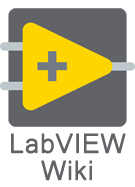Shell Command: Difference between revisions
Appearance
New page: The exec VI function can be used to send shell commands. Include the shell call with the commands that are desired. For example under Windows operating systems the call is to command.com. ... |
No edit summary |
||
| (2 intermediate revisions by one other user not shown) | |||
| Line 1: | Line 1: | ||
The exec VI function can be used to send shell commands. Include the shell call with the commands that are desired. | The exec VI function can be used to send shell commands. Include the shell call with the commands that are desired. Under Windows 2K/XP/Vista operating systems the call is to '''cmd.exe'''. For example, the string to copy filea to a drive would be | ||
[code] | |||
cmd /C "copy filea a:" | |||
[/code] | |||
with the arguments enclosed in quotes. The exact shell call will depend on the operating system. For Windows 98/ME it is '''command.com'''. | |||
command " | To open a document with its associated application, use the '''start''' command. | ||
[code] | |||
cmd /C "start "" "c:\document.txt" | |||
[/code] | |||
will open ''document.txt'' with Notepad (Windows default). | |||
[[category:external code]] | |||
Latest revision as of 09:37, 8 October 2007
The exec VI function can be used to send shell commands. Include the shell call with the commands that are desired. Under Windows 2K/XP/Vista operating systems the call is to cmd.exe. For example, the string to copy filea to a drive would be [code] cmd /C "copy filea a:" [/code] with the arguments enclosed in quotes. The exact shell call will depend on the operating system. For Windows 98/ME it is command.com.
To open a document with its associated application, use the start command. [code] cmd /C "start "" "c:\document.txt" [/code] will open document.txt with Notepad (Windows default).
